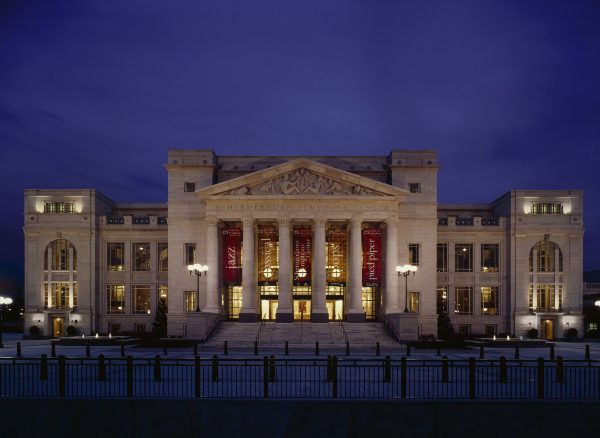Beethoven’s Seventh Headlines Nashville Symphony Performances on February 21-23
Program also includes live recording of Aaron Jay Kernis’ Symphony No. 4, supported by a National Endowment for the Arts grant
Nashville, Tenn. (February 13, 2019) — The Nashville Symphony’s Classical Series resumes on February 21-23 with one of staples of the classical repertoire, Ludwig van Beethoven’s stirring Seventh Symphony – a rhythmic tour-de-force famously described by Richard Wagner as “the apotheosis of the dance.”
The concerts open with a live recording of Pulitzer Prize-winning composer Aaron Jay Kernis’ Symphony No. 4, “Chromelodeon,” which will be released worldwide on Naxos. The performances and recording of Kernis’ work are made possible, in part, thanks to a recently announced Art Works grant from the National Endowment for the Arts (NEA), part of more than $27 million in grants awarded nationwide in the NEA’s first major funding announcement for fiscal year 2019.
Rounding out the program, internationally renowned cellist Alban Gerhardt joins the orchestra as soloist on Samuel Barber’s poignant Cello Concerto.
Great seats are available starting at $20 (pricing valid while supplies last, additional fees apply), and the Symphony’s Soundcheck program offers $10 tickets to students in K-12, college and grad school.
About the Program
Beethoven’s Seventh Symphony — which was on the program of the Nashville Symphony’s first public performance in December 1946 — occupies an important place in the composer’s extensive catalog. It premiered in Vienna on December 8, 1813, at a charity concert for veterans of the recent wars with Napoleon, whose armies were finally retreating after years of conflict, ushering in dramatic political and social changes across Europe.
The piece is particularly notable for its rhythmic and joyous spirit, a departure from most of Beethoven’s contributions to the symphonic genre, which generally unfold as epic journeys from darkness to light. The stylistic shift was fitting for this moment in history and in the composer’s own life, given the sense of impending triumph over Napoleon and his imperialistic ambitions.
The Seventh’s second movement – which provides a melancholy reprieve from the frenzied pace maintained throughout the rest of the symphony – has often been performed on its own as a stand-alone piece, and the work’s powerhouse finale is one of the most memorable passages in Beethoven’s entire repertoire.
Kernis comes to Music City on the heels of winning two GRAMMY® Awards (Best Contemporary Classical Composition, Best Classical Instrumental Solo) earlier this month for his Violin Concerto. A recipient of the prestigious Grawemeyer Award, he also has strong ties to the Nashville Symphony and Music Director Giancarlo Guerrero, serving as workshop director for the organization’s Composer Lab & Workshop.
His Symphony No. 4 was commissioned to mark the 150th anniversary of the founding of the New England Conservatory of Music, and the title “Chromelodeon” comes from a term used previously by maverick American composer Harry Partch to describe one of his own musical inventions. In Kernis’ words, the term aptly describes what he has created with this symphony: “chromatic, colorful, melodic music performed by an orchestra.”
The concept of color plays a central role in much of Kernis’ work because he has synesthesia, a condition that associates specific notes and chords with distinct colors. In “Chromelodeon,” no single color emerges more strongly than any other. The music instead creates an impression similar to a kaleidoscope, with the orchestra serving as “a sort of vehicle for color and combinations,” according to the composer, in a work that conveys a powerful emotional sensibility.
Tickets for Beethoven’s Seventh may be purchased:
- Online at NashvilleSymphony.org/Beethoven7
- Via phone at 615.687.6400
- At the Schermerhorn Symphony Center Box Office, One Symphony Place in downtown Nashville
Additional information, including program notes, performer bios, a Spotify playlist and audio of Giancarlo Guerrero discussing the program, can be found at:NashvilleSymphony.org/Beethoven7.
The GRAMMY® Award-winning Nashville Symphony has earned an international reputation for its innovative programming and its commitment to performing, recording and commissioning works by America’s leading composers. The Nashville Symphony has released 29 recordings on Naxos, which have received 24 GRAMMY® nominations and 13 GRAMMY® Awards, making it one of the most active recording orchestras in the country. The orchestra has also released recordings on Decca, Deutsche Grammophon and New West Records, among other labels. With more than 140 performances annually, the orchestra offers a broad range of classical, pops and jazz, and children’s concerts, while its extensive education and community engagement programs reach 60,000 children and adults each year.
###



